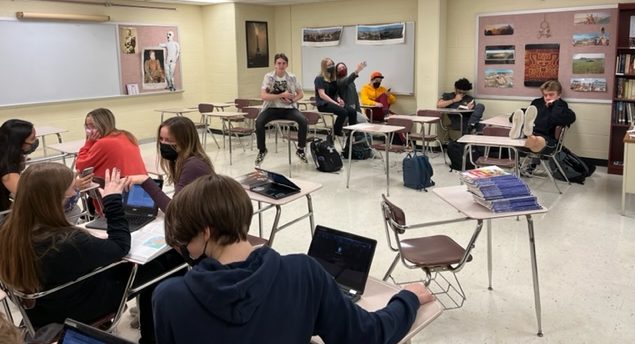Students, staff notice higher levels of student distraction this school year, reflect on potential causes
March 9, 2022
According to an Omega poll taken by 243 students, 78.4 percent reported seeing students being distracted more often in their classes. Additionally, 60.9 percent of students said they personally are feeling less able to concentrate this school year than in years past.
This school year, students, teachers and counselors are noticing higher levels of distraction and aloofness among students. From adjusting to normalcy after a school year of quarantine and different learning styles to being more dependent on technology, they linked this current trend to a range of potential causes.
“It seems like I’m seeing a lot more students [pursuing] off-task behaviors like doodling, [and] I see a lot more students just kind of staring out into space this year. I’m noticing it’s very, very difficult for some reason to hold students’ attention,” Spanish teacher Josh Bodenheimer said.
On one hand, some students feel the increased free time they had last school year due to the hybrid and remote learning schedules made them less able to concentrate in their classes this year.
“Over the pandemic and during e-learning, most of the work [we were given] was able to be done asynchronously by the individual on their own time,” freshman Sydney Moss said. “This leniency and ability to avoid a task by becoming distracted with something else is likely why the pandemic has impacted students’ overall ability to focus in classes.”
Similarly, Bodenheimer believes students might feel less able to concentrate due to facing more structure and discipline than they did last school year.
“In the remote world, we [teachers] weren’t able to hold students to the same behavioral expectations. Last year, for example, if you logged into Zoom, you could pretty much log on to zoom at any point,” Bodenheimer said. “I [also] think there’s something to be said about being in a physical environment and having some of that peer pressure around you.”
On the other hand, some students and staff explained how quarantine and the 2020-2021 school year also drew many students closer to technology, which they feel is contributing to this year’s lower level of student attention.
For instance, social studies teacher Amy Wlodek-Holland is noticing a higher level of dependency among students on their phones, which she believes is a consequence of E-learning last school year.
“I have definitely seen more reliance on phones this year after COVID-19 than I did before,” Wlodek-Holland said. “Remote learning really did hamper student social development, and what I am seeing in a lot of my classes is students are becoming very dependent on their phones as a way to escape socializing with other students.”
That said, according to junior Ella Knickerbocker’s experiences, technology isn’t the only thing to which COVID-19 has drawn students closer. Knickerbocker believes the 2020-2021 school year impacted her in the way Wlodek-Holland illustrated; however, on the contrary, she feels her reliance on technology is partnered with a thirst for more socialization, which she finds equally distracting.
“When we were online, we had free access to our phones and were kept rather isolated from our classmates. That reflects now, as I find myself constantly being drawn to my phone or engaged with others who, due to COVID-19, I didn’t have the chance to talk to,” Knickerbocker said.
With all of this said, counselor Mark Wasik believes there are ways students can combat some of the distractions they face in their classes this year. To do so, he offered a few pointers he thinks are imperative for not only encouraging concentration but also for cultivating a more positive lifestyle.
“I always fall back on routine [and] the ability to continue your path or pursue things that you’re passionate about,” Wasik said. “This time of year, regardless of a pandemic or not—it’s tough. And you add an extra layer [to that] of the collective trauma that we’ve experienced in this pandemic. [Because of that], it’s important that there’s something secure in our routine that can provide comfort and security.”
